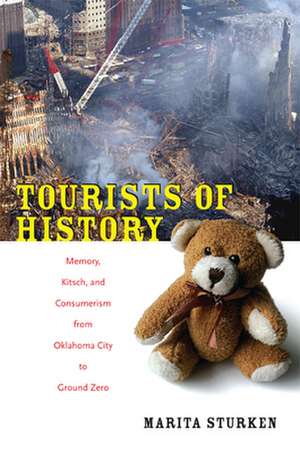Tourists of History – Memory, Kitsch, and Consumerism from Oklahoma City to Ground Zero
Autor Marita Sturkenen Limba Engleză Paperback – 31 oct 2007
Preț: 256.58 lei
Nou
Puncte Express: 385
Preț estimativ în valută:
49.10€ • 51.37$ • 40.78£
49.10€ • 51.37$ • 40.78£
Carte indisponibilă temporar
Doresc să fiu notificat când acest titlu va fi disponibil:
Se trimite...
Preluare comenzi: 021 569.72.76
Specificații
ISBN-13: 9780822341222
ISBN-10: 0822341220
Pagini: 360
Ilustrații: 119 illustrations
Dimensiuni: 156 x 234 x 15 mm
Greutate: 0.51 kg
Editura: MD – Duke University Press
ISBN-10: 0822341220
Pagini: 360
Ilustrații: 119 illustrations
Dimensiuni: 156 x 234 x 15 mm
Greutate: 0.51 kg
Editura: MD – Duke University Press
Cuprins
Introduction; 1. Consuming fear and selling security; 2. Citizens and survivors: Cultural memory and Oklahoma City; 3. The spectacle of death and the spectacle of grief: The execution of Timothy McVeigh; 4. Tourism and Sacred Ground: The space of Ground Zero; 5. Architects of grief and the aesthetics of absence; Conclusion
Recenzii
Tourists of History is a fearless guide through the paranoid landscape of contemporary American culture. Marita Sturken brilliantly maps the ways consumerism and tourism offer avenues of comfort in a threatening world at the same time that they become politically disabling. From the responses to the Oklahoma City bombing to the memorials to the Twin Towers, Sturken shows how the American way of mourning and remembering the dead shores up a conviction in a timeless sense of national innocence. This exceptionally timely book reaches deep into the past and will continue to resonate in the future.Amy Kaplan, author of The Anarchy of Empire in the Making of U.S. CultureTourists of History is a great read: well written, accessible on numerous levels, and driven by a persuasive argument that links tourism, consumerism, and Americans understandings of themselves and their history.Erika Doss, author of Spirit Poles and Flying Pigs: Public Art and Cultural Democracy in American Communities
Notă biografică
Textul de pe ultima copertă
""Tourists of History" is a great read: well written, accessible on numerous levels, and driven by a persuasive argument that links tourism, consumerism, and Americans' understandings of themselves and their history."--Erika Doss, author of "Spirit Poles and Flying Pigs: Public Art and Cultural Democracy in American Communities"
Descriere
How the memorials created in Oklahoma City and at the World Trade Center site raise questions about the relationship between cultural memory and consumerism
